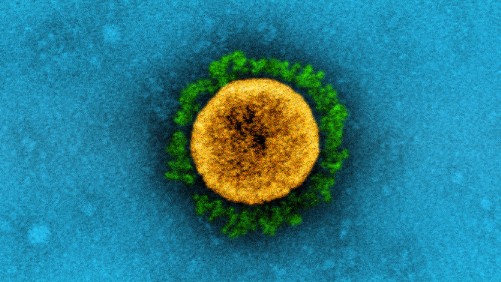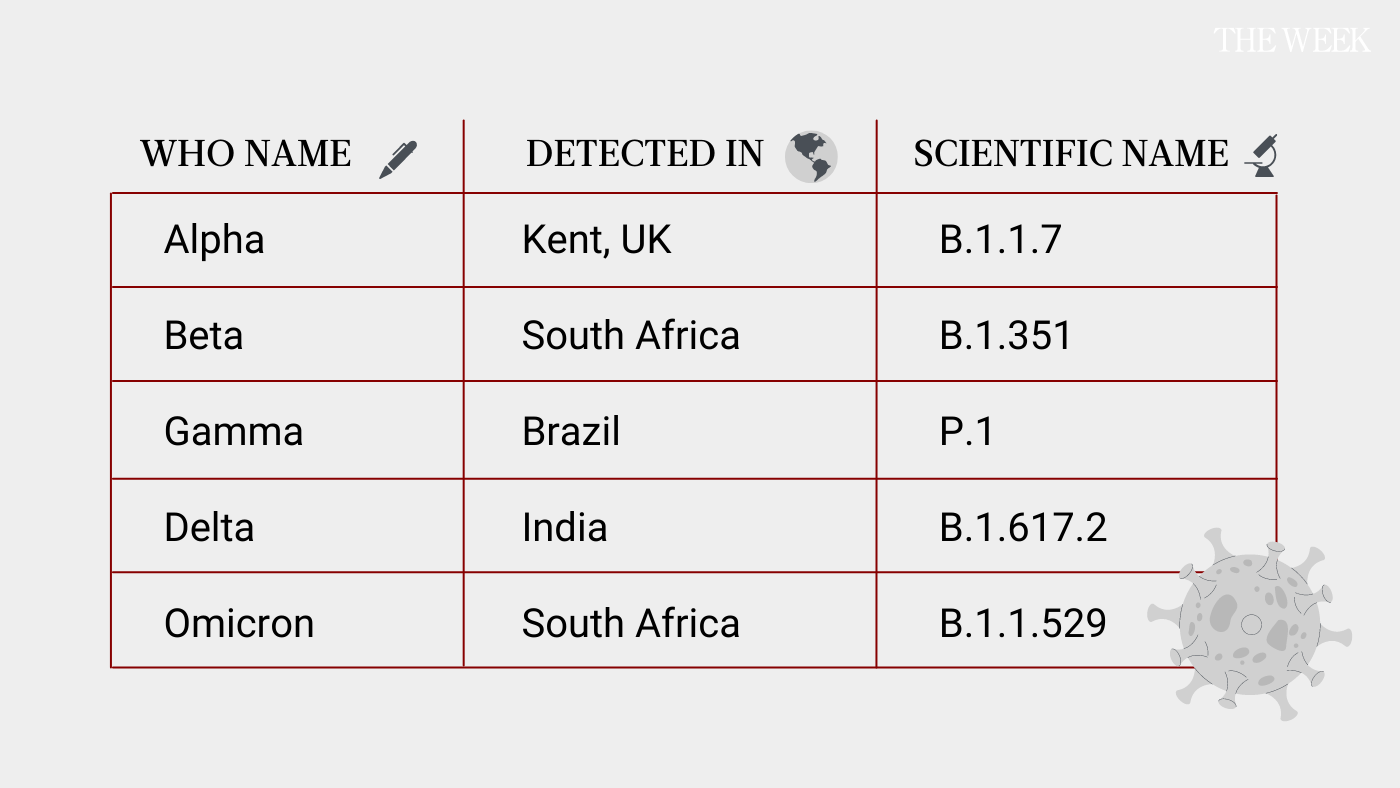World Health Organization: the latest Covid variants of concern
Cases of two new strains of Omicron have been identified in the UK

A free daily email with the biggest news stories of the day – and the best features from TheWeek.com
You are now subscribed
Your newsletter sign-up was successful
The World Health Organization (WHO) is tracking a low number of coronavirus cases that have been caused by two new sub-variants of the Omicron strain.
“Sister variants” of the BA.1 Omicron variant have been added to the WHO’s monitoring list, Reuters reported. Experts are now determining whether these new strains, BA.4 and BA. 5, are “more infectious or dangerous” than previous variants.
Cases of the two new sub-variants have so far been detected in South Africa, Botswana, Belgium, Germany, Denmark and the UK. The US government’s coronavirus response coordinator, Dr Ashish Jha, “called for calm”, and told NBC’s Today: “I don’t think this is a moment where we have to be excessively concerned”.
The Week
Escape your echo chamber. Get the facts behind the news, plus analysis from multiple perspectives.

Sign up for The Week's Free Newsletters
From our morning news briefing to a weekly Good News Newsletter, get the best of The Week delivered directly to your inbox.
From our morning news briefing to a weekly Good News Newsletter, get the best of The Week delivered directly to your inbox.
Omicron was first identified in South Africa on 24 November and was quickly labelled by the WHO as a “variant of concern” – the top level of severity for Covid variants.
What are the variants of concern?
As viruses make copies of themselves to spread, their set of genetic instructions can change a little bit, explains Dr Richard Pebody, who leads the high-threat pathogen team at WHO/Europe.
While these mutations are “usually not significant” they can occasionally result in a variant that is more easily transmitted or more severe than the original, he says. These, therefore, cause more concern than others.
A free daily email with the biggest news stories of the day – and the best features from TheWeek.com
There are two variants of concern currently circulating.
- Omicron (B.1.1.529) Cases of this variant were first identified in South Africa in November 2021 and it is now dominant in the UK. It’s “strikingly” different to other Covid strains “because of the long list of genetic mutations it has undergone”, said the BBC. Studies have pointed to the variant being milder than others, but the “dozens of changes” it has undergone means that the current Covid vaccines “may not be a perfect fit for Omicron”.
There are other variants that have been of concern, but “no longer pose a major added risk to global public health compared to other circulating SARS-CoV-2 variants”. These include:
- Alpha (B.1.1.7): Also known as the Kent variant, samples of this mutation were first documented in September 2020. It was designated a variant of concern on 18 December, which – as The i newspaper noted – “led to tough Covid-19 restrictions in the UK over Christmas”. A study published in the BMJ by the University of Exeter and Bristol in March last year suggested it was linked to a higher chance of hospitalisation and death than the original strain.
- Beta (B.1.351): This variant was first documented in May 2020 in South Africa. It is believed to spread more quickly than the original strain, but is not thought to be more deadly. As of 8 April, fewer than 1,000 confirmed and probable Covid cases in the UK were attributed to Beta, according to government data.
- Gamma (P.1): P.1 was first identified in Brazil in November 2020 and designated a variant of concern in January 2021. People infected with the Gamma variant “may present more often with cold-like symptoms” compared with other variants, according to a study published in the journal of infection in February.

In the past, other variants of interest but not concern have included Zeta, Kappa and Lambda, which accounted for a very small number of cases in the UK. There are currently no variants of interest identified by the WHO.
Should we be worried about the new Omicron variants?
The WHO’s regional director for Africa, Dr Matshidiso Moeti, said that “there is no cause for alarm with the emergence of the new sub-variants” BA.4 and BA.5. “We are not yet observing a major spike in cases, hospitalisations or deaths.”
The WHO is calling on countries to up genomic surveillance to gain a better understanding of the new Omicron variants.
A recombinant variant – a variant which combines genetic material from multiple other strains – called Omicron XE has also recently emerged. As of 5 April, just over 1,000 cases were identified in the UK.
The variant has a combination of mutations from the Omicron BA.1 and BA.2 strains. “While we don’t know a lot about it yet, what we do know doesn’t suggest there’s cause for serious concern,” Grace C Roberts, a research fellow in virology at the University of Leeds, said at The Conversation.
This variant is among those being monitored by the WHO.
-
 Sepsis ‘breakthrough’: the world’s first targeted treatment?
Sepsis ‘breakthrough’: the world’s first targeted treatment?The Explainer New drug could reverse effects of sepsis, rather than trying to treat infection with antibiotics
-
 James Van Der Beek obituary: fresh-faced Dawson’s Creek star
James Van Der Beek obituary: fresh-faced Dawson’s Creek starIn The Spotlight Van Der Beek fronted one of the most successful teen dramas of the 90s – but his Dawson fame proved a double-edged sword
-
 Is Andrew’s arrest the end for the monarchy?
Is Andrew’s arrest the end for the monarchy?Today's Big Question The King has distanced the Royal Family from his disgraced brother but a ‘fit of revolutionary disgust’ could still wipe them out
-
 A Nipah virus outbreak in India has brought back Covid-era surveillance
A Nipah virus outbreak in India has brought back Covid-era surveillanceUnder the radar The disease can spread through animals and humans
-
 Covid-19 mRNA vaccines could help fight cancer
Covid-19 mRNA vaccines could help fight cancerUnder the radar They boost the immune system
-
 The new Stratus Covid strain – and why it’s on the rise
The new Stratus Covid strain – and why it’s on the riseThe Explainer ‘No evidence’ new variant is more dangerous or that vaccines won’t work against it, say UK health experts
-
 RFK Jr. vaccine panel advises restricting MMRV shot
RFK Jr. vaccine panel advises restricting MMRV shotSpeed Read The committee voted to restrict access to a childhood vaccine against chickenpox
-
 RFK Jr. scraps Covid shots for pregnant women, kids
RFK Jr. scraps Covid shots for pregnant women, kidsSpeed Read The Health Secretary announced a policy change without informing CDC officials
-
 New FDA chiefs limit Covid-19 shots to elderly, sick
New FDA chiefs limit Covid-19 shots to elderly, sickspeed read The FDA set stricter approval standards for booster shots
-
 RFK Jr.: A new plan for sabotaging vaccines
RFK Jr.: A new plan for sabotaging vaccinesFeature The Health Secretary announced changes to vaccine testing and asks Americans to 'do your own research'
-
 Five years on: How Covid changed everything
Five years on: How Covid changed everythingFeature We seem to have collectively forgotten Covid’s horrors, but they have completely reshaped politics